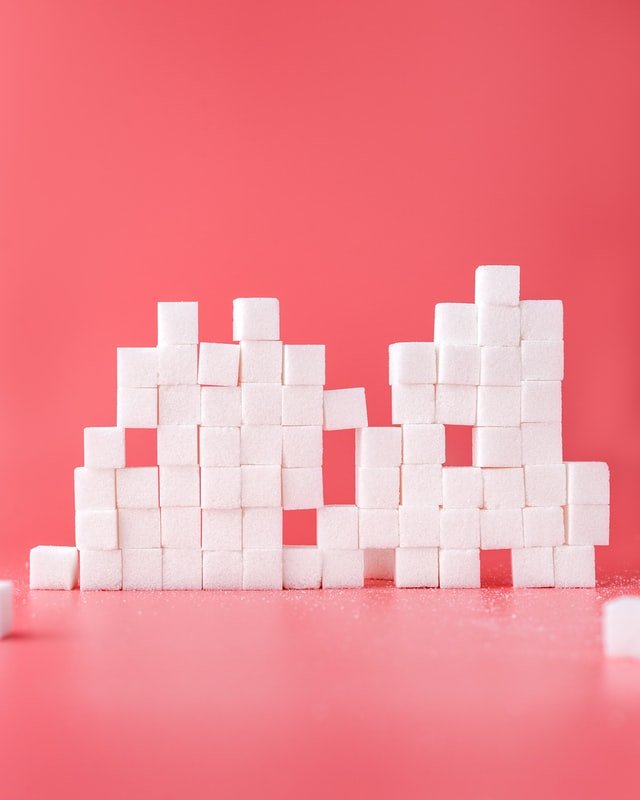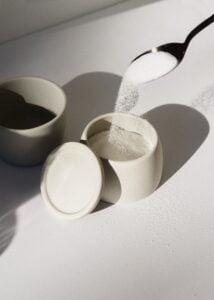Sugar in Kids’ Food: The Truth About it
- Published on:
- Last update: 13 November 2023

It makes me feel hypocritical to write about the dangers of sugar, when right now I’m heating up my oven, about to bake some chocolate chip cookies. So, while I munch on my sandwich, I’ll attempt to effectively convince you there are negative effects of sugar and how you need to monitor your children’s sugar consumption.
With 31 nutrition courses and studies on sugar’s chemical structure, I am aware of sugar’s dangers. I still use processed sugar even though I use only organic sugar. Moreover, processed sugar is harmful for your health, your kids’ health, and for pretty much everyone.
Regardless, has anyone among us stopped consuming those incredibly sweet crystals one way or another even knowing the negative effects? Of course not! Let’s discuss the harms of sugar in children’s health.
Negative Effects of Sugar:

It’s easy to understand why sugar is so hard to kick when you consider the following:
- There is an eight-fold increase in addiction to sugar compared to cocaine.
- Sugar is made from a natural source (sugar cane and sugar beet) so many manufacturers claim that it is okay. Heroin and opium-derived from “natural” sources are also illegal. In the process of being made into something bad for our health, these “natural” things are processed into something dangerous.
- We may think we’re cutting down on sugar, but it’s actually quite surprising how many foods we consume contain hidden sugars. The challenge of reducing kids’ sugar intake grows more complex because almost everything we buy at the grocery store – from spaghetti sauce to plain yoghurt – contains some amount of refined sugar.
1: Different Kinds of Sugar
Following is a breakdown of the different kinds of sugar and their sources:
- Fruit sugar is fructose, which is found in fruits
- Maltose is found in germinating grains and is a form of sugar. You can find malted milkshakes and candy made with it.
- Lactose is a milk sugar that can be found in milk
- “Corn sugar” is made from dextrose, a synthetic product using starch.
- Almost all sugar beets are genetically modified, making sugar even more dangerous. Sugar cane and sugar beets are both sources of refined sugar or table sugar.
- The last one is glucose. Fruits and vegetables contain this sugar, which is often combined with other sugars. This sugar is an essential component of the metabolism of all plants and animals. Almost everything we eat goes into our bloodstream as glucose. Blood sugar is often referred to as glucose since it is always present in our bloodstream.
2: Glucose vs. Sucrose
Our bodies convert food into glucose, so refined sugar (sucrose) is acceptable. The sugar-pushing manufacturers have bragged about this. The reality, however, is completely different.
Both sucrose and glucose enter the body in profoundly different ways, and they also affect it in profoundly different ways. In simple terms, the glucose keeps us alive, but sucrose slowly poisons us.
What is low blood sugar or hypoglycemia? Have you ever met someone who has either of these conditions? Never let them fool you into thinking they don’t consume much-refined sugar. Sugar addiction is the result of consuming large amounts of sugar, which suppresses glucose in the body. Glucose or blood sugar in their bodies would return to normal if they stopped binging on sugar.
3: How Sucrose or Table Sugar Gets into Our Body
Refined sugar is the white stuff we consume every day. It is not digested in the mouth or the stomach but passes immediately and very rapidly into the lower intestines and bloodstream. Sugar’s negative effects start to manifest themselves on every organ in our body. You can see the harms of sugar in the long run.
Top Reasons Kids Should Not Eat Sugar: Harms of Sugar
You shouldn’t let your kids consume large amounts of sugar. Here are some reasons. Whenever I refer to sugar, I mean sucrose or refined sugar. Harms of sugar is real.

1: Suppresses The Immune System Of Your Child
Children’s immune systems can be suppressed by sugar, which makes them less able to fight infectious diseases. In other words, your child is susceptible to all types of illnesses, colds, flu, etc.
Suggestion:
All of us want our children to be healthy and happy, so curb their sugar intake. Rather than sugary snacks, eat fruit such as blueberries (helps the brain), bananas (eases stress), or raw honey on Ezekiel bread. While honey is sugar, it is also a real food that’s packed with nutrients that assist in building a healthy immune system.
2: Sugar Makes Kids Hyperactive And Decreases Their Ability To Focus
A high intake of sugar in childhood can cause children to rise rapidly in adrenaline, resulting in hyperactivity, anxiety, difficulty concentrating, and crankiness.
Suggestion:
As a parent, you want your kids to succeed academically. Identify what foods you are serving them for breakfast and what you are packing in their lunch boxes. What is my knowledge and understanding about the negative effects of sugar on my child?
Don’t eat sugary cereals for breakfast and fast food for lunch. Breakfasts with eggs increase brain power thanks to the choline. Bananas are a potassium-rich fruit that helps kids stay alert during the day because they are easy to concentrate on.
3: Sugar Weakens Eyesight
Sugar increases blood sugar levels and can cause the lens of the eye to swell, which will impair your child’s ability to see. Normally, your child’s eyesight will return to normal once he or she is off sugar or doesn’t consume large amounts of sugar. One of the harms of sugar to children is weakening of the eyesight.
Suggestion:
To ensure your child is able to have strong eyesight, eliminate sugar from your diet, and feed them foods rich in lutein and zeaxanthin, such as broccoli, avocados, eggs, and carrots. A wonderful way to improve your eyesight is by using oils such as cod liver oil. Also, cod liver oil (lemon flavour) is not unpleasant to consume.
4: Sugar Can Cause Stomach Aches, Indigestion, and Acidic Digestive Tract
Do your children suffer from stomach aches often? Is this because of digestion or stomach acid? How much sugar do they consume in the form of sodas, candy, and cookies?
This condition can cause many problems with the digestive system, including acidic digestion, indigestion, and mal-absorption, meaning important vitamins and minerals are not absorbed. As a result, your kids may feel uncomfortable at school and may find it difficult to learn, understand, and absorb information. Kids may feel the effects of sugar differently.
Suggestion:
Sugary snacks should be abandoned by children suffering from stomachaches or indigestion. Sugary snacks should be replaced with these calming stomach foods: bananas, brown rice, sweet potatoes, yoghurt, and oatmeal.
3 Ways to Curb the Sugar Craving

1: The children and teens you care about need to see that you value a healthy diet and that you are willing to lead by example. It is important to begin teaching your kids about foods that build the brain and foods that impair brain function at an early age. Start by eliminating sugar as much as possible and substituting healthy foods such as vegetables, almonds, or raisins.
2: Create a plan with your family on how to eliminate excess sugar from your diet. Choose not to drink soda every day and limit yourself to one per week. Make healthy snacks such as cheese or nuts your go-to snacks instead of candy bars and sugary snacks.
3: I have written about healthy snacks, bananas, cucumbers, eggs, water, healthy fats, honey, and veggies and how to substitute these foods whenever your children want something sweet.
In addition to fermented foods, fermented products also decrease sugar cravings. The more sugar is removed from your kids’ diets and your own, the better their thinking and learning abilities will be. There will also be a difference in everyone’s moods, emotions, energy, and outlook on life.
Visit Yummy Valley now to purchase baby food.
Share this post:

